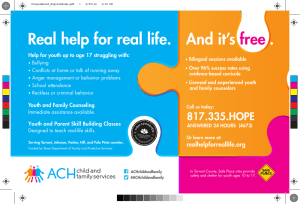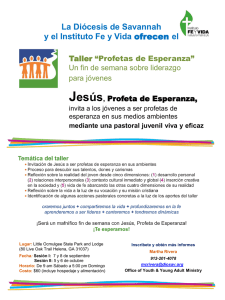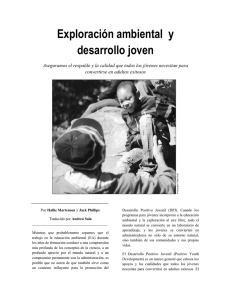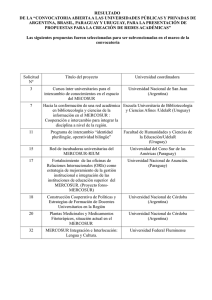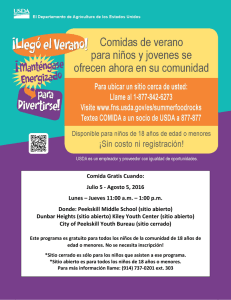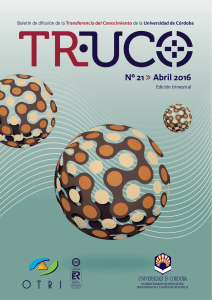Uruguay - Fekete Sereg Ifjúsági Egyesület
Anuncio
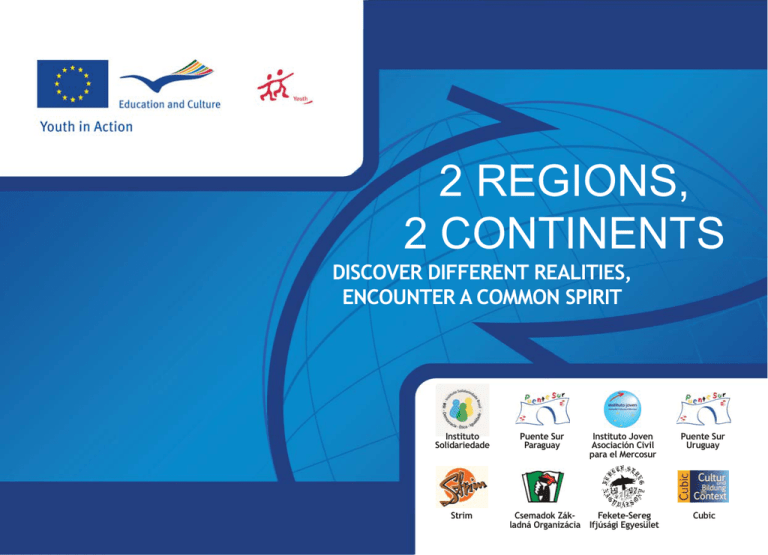
2 REGIONS, 2 CONTINENTS DISCOVER DIFFERENT REALITIES, ENCOUNTER A COMMON SPIRIT Instituto Solidariedade Strim Puente Sur Paraguay Instituto Joven Asociación Civil para el Mercosur Csemadok ZákFekete-Sereg ladná Organizácia Ifjúsági Egyesület Puente Sur Uruguay Cubic Grant awarded by the European Commission, Education, Audiovisual and Culture Executive Agency , for the project 144400-3.2 –HU-2008-R1 within the “Youth in Action” Programme Action 3.2. – “Youth in the world”: „ Cooperation with countries other than the neighbouring countries of the European Union” Maximum contribution of EUR 87.765,86, equivalent to 79,72% of the estimated total eligible costs indicated” (EUR 114.795,86) Sole responsibility for the content of publication lies with the author and the Agency is not responsible for any use that may be made of the information contained herein.” Project promoter: „Fekete Sereg” Ifjúsági Egyesület 8291-Nagyvázsony, Petőfi u. 2. Hungary www.fekete-sereg.hu www.2regions2continents.org Strim Instituto Solidariedade Bruty - Slovakia Krakow - Poland Csemadok Základná Organizácia Fekete-Sereg Ifjúsági Egyesület Rio de Janeiro - Brasil Puente Sur Paraguay Nagyvázsony - Hungary Cubic Ciudad del Este - Paraguay Instituto Joven Asociación Civil para el Mercosur Puente Sur Uruguay Buenos Aires - Argentina Montevideo - Uruguay Innsbruck - Austria design & DTP: Attila Nyuzó - Hungary, [email protected] press: OOK-Press Kft - Hungary 2 regions, 2 continents Discover different realities, encounter a common spirit Our international youth project “2 regions, 2 continents” brought together eight youth organizations from 2 different regions and continents: the involved countries were Argentina, Brazil, Paraguay and Uruguay, representing the Mercosur region, and countries from Central Europe, namely Austria, Hungary, Poland and Slovakia. Under the motto “discover different realities, encounter a common spirit” we could establish a sustainable partnership for the exchange of good youth work practices for the inclusion of young people with fewer opportunities. We started off with a seminar on Cultural Diversity and Integration in Uruguay, followed by a study visit in Argentina, comparing the Mercosur and European realities of inclusion. Both events reflected on achievements and challenges, and provided a platform for common learning and development. The target group was youth work professionals. All partner countries implemented training courses, seminars and public events on national or regional level, focusing on the empowerment of young people, cultural diversity, inclusion, and the present situation of minorities in the regions. These activities can be considered as good practice examples of the development of minority and immigrant integration projects, and as a tool for adding innovation and inspiration to future youth projects. The target group included young youth workers and young people from disadvantaged backgrounds, who would go on to act as peer-educators, coaches and project promoters in follow-up projects. The project closed with two consecutive international se-minars in the Austro-Hungarian border regions. The seminar in Hungary focussed on the topic of the Central European youth work reality and the situation of minorities and best practice examples of intercultural minority dialogue pro-jects. It was followed by the closing evaluation seminar in Austria. The project had the following objectives: - to exchange good methods regarding integration of minority groups between Mercosur and Central European countries - to activate and encourage young people belonging to minority groups to actively participate in society - to stimulate local youth work and strengthen integration of minorities and migrant people - to reflect on the situation of ethnic minorities and immigrants - to experience intercultural diversity as value and tool - to initiate co-operation between Mercosur and Central European countries, finding added value in the comparison of their contexts - to share similarities and differences in the methodologies of inclusion A video about the local activities is available on DVD and downloadable from our website www.2regions2continents.org. The project’s outcomes are reflected also in other publications: The activities of “Puente Sur” in Uruguay have been chosen for a booklet of best practice examples for participation, published by the UNICEF - office of South America and the Caribbean - and the international NGO "Innovations in Civic Participation". The training activities of “Fekete Sereg” in Hungary have been selected as one of the 30 good practice projects presented in the exhibition catalogue “EU projects in favour of the ROMA Community” of the European Commission. 6 Country: Date and venue of activity: Promoter: Partners: Promoter’s address: Website: E-mail: Telephone: Argentina Argentina 11-14/06/2009 Valle de Punilla y Ciudad de Alta Gracia Instituto Joven Asociación Civil para el Mercosur Biblioteca Argentina para Ciegos (BAC); Secretaria de Juventud de la Provincia de Cordoba; Gobierno de la Provincia de Cordoba, Municipalidad de la Ciudad de Cordoba, Concejo Delibarante de la Ciudad de Cordoba; Secretairia de Accesso a la Technologia y la Informatión C1414CPE Ciudad Autónoma de Buenos Aires, Dr. Emilio Ravignani 1243 www.puentesur.org [email protected] + 54 11 4338 4774 “2 regions 2 continents” The first local activity was a national youth encounter in Argentina, realized in June 2009, in the province of Cordoba, which brought together 74 visually impaired young people from all over the country, under the topic “be informed to be part” In the year of the bicentenary of Louis Braille, this event - organized by the Youth Institute for the Mercosur in cooperation with a number of other entities – aimed at increasing the visibility of blind people and their active participation in public life. They prepared reports for the regional radio and the monthly magazine in braille, using new technologies for communication, taking part in workshops, concerts and excursions. Austria Country: Date and venue of activity Promoter: Partners: Promoter’s address: Website: E-mail: Telephone: Austria 11-13/10/2009; 25-26/10/2009 Innsbruck Cubic Department for Integration and Youth Department of the Regional Government of Tyrol 6020 Innsbruck, Bäckerbühelgasse 5. www.cubic-online.eu [email protected] + 43 512 286037 Youth work, Migration, Intercultural Dialogue Regional Seminar “Open Youth Work, Migration, Intercultural Dialogue” 11-13/10 The training gathered youth workers from different youth work institutions. Main concerns were the fostering of intercultural dialogue, and the awareness raising on integrative issues. Inputs on the integration program and strategy of the regional government were followed by exchange of experiences in daily youth work routine, discussions and recommendations for action. The program was rounded up by an exercise against xenophobic or excluding slogans. Regional Training “Open Youth Work, Migration, Intercultural Dialogue” 25-26/10 In this training course participants were young people with migration background interested in getting actively involved in diversity youth work. Together they reflected on the concepts of identity, interculturality and integration in the context of migrant youth work. They took a first step to increase their employability by improving their personal skills and competences in the field. 7 8 Country: Date and venue of activity: Promoter: Partners: Promoter’s address: Website: E-mail: Telephone: Brazil 26-30/10/2009 Nova Iguacu, Rio de Janeiro Instituto Solidariedade Brasil (ISB) Instituto Beneficente Brasil – Italia IBBI 22222000 Rio de Janeiro, Avenue Beira Mar, 216 – Térreo www.isb.org.br [email protected] + 55 21 2517 0554 Brasil Human Rights training Course The local activity in Brazil, in October, involved young people from the urban districts and the favela neighbourhoods of Rio de Janeiro: participants travelled within the territory of the city to get to know the very diverse realities of young people living in Rio, to identify points of difference, and to discuss the challenges of building a just and caring society. A forum on human rights education was held, and the event was closed by a “neighborhood party.” Hungary Country: Date and venue of activity: Promoter: Partners: Promoter’s address: Website: E-mail: Telephone: Hungary 27-31/07/2009 Kéked “Fekete Sereg” Ifjúsági Egyesület (Youth Association) Diagonál Magyarország 8291-Nagyvázsony, Petőfi u. 2. www.fekete-sereg.hu [email protected];[email protected] + 36 88 264 464 It is neither white nor black In Kèked, in Hungary, in the last week of July, 20 participants, Roma youth workers, social assistants, young people with Roma background from small villages from 3 different regions, met for 4 days to exchange their knowledge, to experience new methods for their daily youth work practice, and to lay the foundations for a long term network and a sustainable partnership. The project was based on 3 important pillars: 1) the up-to-date scientific Romology knowledge, 2) the use of the “dispute method”, a controversial form of discussion with mediation, as an argumentative training which proved to be very useful (e.g. on the topics integration versus segregation), and finally 3) a practical part, consisting of a small research, collecting Roma life knowledge in a small village, in Kéked, and of a video registered interview (50 minutes of video report with 9 Roma inhabitants between 25 and 85 years old) in Bódvalenke, a Roma “ghetto village” – in the north-east of Hungary. The follow up consisted in continuing contact with participants after the meeting, and offered support for the development and implementation of inclusion projects. 9 10 Country: Date and venue of activity: Promoter: Promoter’s address: Website: E-mail: Telephone: Paraguay 15-18/10/2009 Ciudad del Este Puente Sur - Paraguay 7000 Ciudad del Este Alto Parana www.puentesur.org [email protected] + 595 983 6898 99 Pa ra g u a y Regional forum Reality of migration in Paraguay In a 4-days-seminar in Puente Sur, in Ciudad del Este, Paraguay, 23 participants gathered to develop social projects, later on to be implemented in their respective local realities. Comparing the different situations of migrants in the so called 3 borders’ zone (Argentina, Paraguay, Brazil) they tried to find ways of spreading knowledge and increasing awareness about the different cultures in order to foster their inclusion. The involved participants, coming from different communities, had diverse ethnic and socioeconomic backgrounds. One of the developed follow activities will be a big art festival, in the community called “kilometer 12”, in the immediate neighborhood of the waste deposit of the municipality, to show the reality of the people living there, about 12 kilometers away from the city, as “garbage people”. Po l a n d Country: Date and venue of activity: Promoter: Promoter’s address: Website: E-mail: Telephone: Poland 12-13/06/2009 Korzkiew;14/11/2009 Krakow;3-30/12/2009 Krakow Strim Pawlikowskiego 5/5 31 127 Krakow www.strim.org.pl [email protected] + 48 12 422 55 64 11 Intercultural meeting for getting to know eachother and ourselves The local activity in Poland consisted mainly of 3 bigger activities: the first meeting was realized in June in Korzkiew, where a group of people of different nationalities met and experienced methods of intercultural learning, self-presentation and self-reflection in an international group. The second meeting was a small training course in November about the implementation of Youth in Action projects for people who work with migrants and marginalized people. The third part was a photo exhibition about immigrants, different ethnical backgrounds and the society of our city seen with “outsider’s eyes”. In between, smaller meetings to ensure the preparation, group integration etc. were organized. The overall aim of the activities was fostering the social integration of different nationalities or ethnic backgrounds. The participants got the necessary knowledge to act as multipliers later on, activating other people to make something interesting within the intercultural field in their own environments. 12 Country: Date and venue of activity: Promoter: Promoter’s address Website: E-mail: Telephone: Slovakia 4-5/07/2009 Hrabušice;15-16/08/2009 Salka; Csemadok Základná Organizácia Bruty 94355 Bruty 111 www.csemadokbart.sk [email protected] + 421 915 455 179 Slovakia Attention Europe, we are coming! In July in Hrabušice in Slovakia, the local young people of the village Bruty belonging to the Hungarian minority in Slovakia learnt in a 4 day training course about the structure, the opportunities and examples of good practice of the Youth in Action program and had the opportunity to plan their own projects on a local level. Through inputs, presentations of examples of good practice, discussions and work in small groups, the participants got acquainted with the principles and priorities of Youth in Action: intercultural learning, solidarity, cultural diversity, open-mindedness and respect, active participation and citizenship. They made presentations, role plays and workshops and prepared themselves to run a youth exchange on their own. In August, in Salka, the participants analyzed and described Slovakia and the situation of its minorities and fostered their cooperation through team building exercises. As a result of the activity, 20 young people from a small village are ready to take part in the Youth in Action program and ready to implement projects. 3 projects are waiting for partners. Uruguay Country: Date and venue of activity: Promoter: Partners: Promoter’s address: Website: E-mail: Telephone: Uruguay 11-13/09/2009 Palmar, Soriano; 10/10/2009 Paysandu; Puente Sur Uruguay Programa Soriano Joven; Soriano Departemento Fértil; Renovacion Wilsonista; 11200 Montevideo, Br. José Battle y Ordonez 2486 www.puentesur.org [email protected] + 598 2 507 3287 13 Training course for local delegates of the Youth Office of Soriano In September 2009, 22 youth workers and youth leaders met in Soriano, Uruguay, for a youth work training on communication, cooperation between institutions, networking and tele-education. The training offered tools for capacity building in digital literacy especially for rural areas, and gave space to exchange about the interlinked concepts of Information and Youth Participation. Participants also gained some insights in conflict resolution. Meeting: Also young people contribute knowledge In October, more than 50 youngsters gathered for a “knowledge day” to collect ideas around the topics of youth participation, non formal education and lifelong learning, health and quality of life, housing and employment. Uruguay País: Fecha y lugar de la actividad: Organizador: Partenarios Dirección: Sitio web: Correo electronic: Teléfono: Uruguay 11-13/09/2009 Palmar, Soriano; 10/10/2009 Paysandu; Puente Sur Uruguay Programa Soriano Joven; Soriano Departemento Fértil; Renovacion Wilsonista; 11200 Montevideo, Br. José Battle y Ordonez 2486 www.puentesur.org [email protected] + 598 2 507 3287 13 Seminario “Formación de los referents locales de la Oficina de la Juventud de Soriano” En septiembre 2009, 22 trabajadores juveniles y monitores se encontraron en Soriano, en Uruguay, para asistir a una formación sobre comunicación, fomento del trabajo interinstitucional, trabajo en red, y tele-formación. La formación ofreció herramientas de capacitación en alfabetización digital para pobladores del área rural y pequeñas poblaciones, y se pretendió propiciar un espacio de intercambio de Información y Participación Juvenil. También se dotó a los participantes de algunas herramientas en resolución de conflicto. En octubre, más de 50 jóvenes se reunieron para un “día de conocimiento’” para aportar ideas alrededor de temas como participación, educación no formal, aprendizaje a lo largo de la vida, salud, calidad de vida, alojamiento, y empleo. 12 País: Fecha y lugar de la actividad: Organizador: Dirección: Sitio web: Correo electronic: Teléfono: Eslovaquia 4-5/07/2009 Hrabušice;15-16/08/2009 Salka; Csemadok Základná Organizácia Bruty 94355 Bruty 111 www.csemadokbart.sk [email protected] + 421 915 455 179 Eslovaquia Atencion Europa, aquí estamos! En julio, en Hrabušice en Eslovaquia, se realizó un curso de formación para jóvenes pertenecientes a la minoría húngara, recibieron información sobre la estructura y las posibilidades del programa Juventud en Acción, y tuvieron la oportunidad de planificar y preparar sus propios proyectos. A través de ponencias y presentaciones de ejemplos de buenas prácticas, discusiones y trabajo en pequeños grupos, los participantes se familiarizaron con los conceptos y prioridades del programa Juventud en Acción: aprendizaje intercultural, solidaridad, diversidad cultural, apertura de espíritu y respeto, participación y ciudadanía activa. Hicieron presentaciones, juegos de rol, exhibiciones y concursos, y se prepararon activamente para la implementación de sus propios proyectos. En agosto, en una formación en Salka, los participantes analizaron y describieron la situación de las minorías en Eslovaquia, y fortalecieron su trabajo en equipo a través de juegos de cooperación. Como resultado de las actividades, 20 jóvenes de un pueblo pequeño son preparados para participar en Juventud en Acción y para desarrollar proyectos. 3 proyectos están listos... Po l o n i a País: Fecha y lugar de la actividad: Organizador: Dirección: Sitio web: Correo electronic: Polonia 12-13/06/2009 Korzkiew;14/11/2009 Krakow;3-30/12/2009 Krakow Strim Pawlikowskiego 5/5 31 127 Krakow 11 www.strim.org.pl [email protected] Un encuentro intercultural donde conocer los demas y nosotros Las actividad locales en Polonia consistieron en 3 eventos diferentes: la primera actividad se realizó en Junio en Korzkiew, donde un grupo de jóvenes de diferentes nacionalidades se encontró para experimentar métodos de aprendizaje intercultural, de presentación y de reflexión en un grupo internacional. El segundo encuentro fue organizado en Cracovia en Noviembre para inmigrantes y para profesionales que trabajan con inmigrantes. Durante este encuentro los participantes conocieron los asuntos más esenciales sobre del programe Juventud en Acción. Los participantes recibieron las herramientas necesarias para promover sus ideas en el futuro, activando a otros jóvenes para hacer proyectos interesantes en el ámbito intercultural en sus entornos respectivos. La tercera actividad fue la exhibición de fotos “Mi Cracovia”, mostrando a los inmigrantes en Cracovia y sus lugares favoritos en nuestra ciudad. 10 País: Fecha y lugar de la actividad: Organizador: Dirección: Sitio web: Correo electronic: Teléfono: Paraguay 15-18/10/2009 Ciudad del Este Puente Sur - Paraguay 7000 Ciudad del Este Alto Parana www.puentesur.org [email protected] + 595 983 6898 99 Pa ra g u a y Foro regional “Realidad de la migración en Paraguay” En octubre, se reunieron 23 jóvenes para participar en una formación de 4 días en Ciudad del Este, en Paraguay, para desarrollar proyectos sociales, con el propósito de realizarlos en un futuro próximo en sus entornos locales. Comparando diferentes situaciones de inmigrantes de la llamada “zona de las tres fronteras” (Argentina, Paraguay, Brasil), los participantes intentaron encontrar caminos para diseminar información e impartir el conocimiento sobre las diferentes culturas, para mejorar la integración entre ellas. Una de las actividades concretadas durante la formación fue un gran festival de arte, en las inmediaciones del vertedero municipal, para mostrar la realidad de vida de la gente que vive allí, a una distancia de 12 kilómetros de la ciudad, conocida “gente del basural”. Hungría País: Fecha y lugar de la actividad: Organizador: Partenarios: Dirección: Sitio web: Correo electrónico: Teléfono: Hungría 27-31/07/2009 Kéked “Fekete Sereg” Ifjúsági Egyesület (Asociación de la Juventud) Diagonál Magyarország 8291-Nagyvázsony, Petőfi u. 2. www.fekete-sereg.hu [email protected];[email protected] + 36 88 264 464 9 Ni blanco ni negro En Kèked, en Hungria, en la última semana de julio, 20 participantes, trabajadores juveniles y sociales y jóvenes de orígen Rumano, de pequeños pueblos de 3 regiones diferentes, se encontraron por 4 días para intercambiar sus conociemientos, experimentar nuevos métodos útiles para el trabajo diario, y sentar las bases de un trabajo en red y de un partenariado sostenible. La metodología consistía en tener un acceso práctico, sirviendose del entorno Rumano e integrar diferentes edades. El proyecto tenía 3 fundamentos: 1) utilizando el saber científico actual de la Rumalogia, 2) utilizando el “método disputa” , una forma de controversia con mediación, un entrenamiento argumentativo, y finalmente 3) una parte práctica, que consistió en una pequeña encuesta, registrando la experiencia de vida de los Rumanos en Keked, y en un pequeño video (50 minutos con 9 Rumanos entre 25 y 85 años) con entrevistas de los habitantes de Bódvalenke, un “pueblo ghetto” Rumano en el nordeste de Hungría. El seguimiento consistió en el contacto continuo con los participantes después del encuentro, y el apoyo ofrecido para el desarrollo y la implementación de proyectos de integración. 8 País: Fecha y lugar de la actividad: Organizador: Partenarios: Dirección: Sitio web Correro electronic: Teléfono: Brasil 26-30/10/2009 Nova Iguacu, Rio de Janeiro Instituto Solidariedade Brasil (ISB) Instituto Beneficente Brasil – Italia IBBI 22222000 Rio de Janeiro, Avenue Beira Mar, 216 – Térreo www.isb.org.br [email protected] + 55 21 2517 0554 Brasil Curso de formación en derechos humanos En la actividad local de Brasil acudieron jóvenes de distintos barrios urbanos y de las favelas de Río de Janeiro para conocer, viajando por la ciudad, las realidades de vida muy distintas de los jóvenes que viven en Río de Janeiro. Identificaron puntos de diferencia, y discutieron obstáculos y desafíos para llegar a una sociedad más justa y solidaria. Hicieron un foro sobre educación en derechos humanos, y cerraron el evento con una “fiesta de barrio”. Austria País: Fecha y lugar de la actividad: Organizador: Partenarios: Dirección: Sitio web: Correo electrónico: Teléfono: Austria 11-13/10/2009; 25-26/10/2009 Innsbruck Cubic Departemento de Integración y Departemento de Juventud del Gobierno Regional 6020 Innsbruck, Bäckerbühelgasse 5. www.cubic-online.eu [email protected] + 43 512 286037 7 “Trabajo juvenil, migración, diálogo intercultural Curso de formación regional “Trabajo juvenil, migración, diálogo intercultural, 11. – 13.10. 2009 La formación reunió trabajadores juveniles de diferentes instituciones de la región, con los objetivos de fortalecer el diálogo intercultural, y de crear conciencia en cuestiones de integración. La presentación de la estrategia de integración del gobierno regional fue seguido por un intercambio de experiencias de la rutina del trabajo juvenil, de discusiones y recomendaciones para actuar. La formación se cerro con una dinámica de argumentación contra la xenofobia y actitudes de exclusión. Curso de formación regional “Trabajo juvenil regional y diálogo intercultural”, 25. – 26.10. 2009 Un curso de formación con el título “Trabajo juvenil regional y diálogo intercultural” se realizo en octubre en Innsbruck, Austria. Los participantes con trasfondo migratorio habían manifestado interés de involucrarse en el trabajo intercultural con jóvenes, y trabajaron juntos sobre los conceptos de identidad, interculturalidad e integración en el contexto del trabajo juvenil con jóvenes inmigrantes. Hicieron con esta formación un primero paso para desarrollar sus aptitudes y competencias personales en dicho sector. 6 País: Fecha y lugar de la actividad: Organizador: Partenarios: Dirección: Sitio web: Correo electrónico: Teléfono: Argentina Argentina 11-14/06/2009 Valle de Punilla y Ciudad de Alta Gracia Instituto Joven Asociación Civil para el Mercosur Biblioteca Argentina para Ciegos (BAC); Secretaria de Juventud de la Provincia de Cordoba; Gobierno de la Provincia de Cordoba, Municipalidad de la Ciudad de Cordoba, Concejo Delibarante de la Ciudad de Cordoba; Secretairia de Accesso a la Technologia y la Informatión C1414CPE Ciudad Autónoma de Buenos Aires, Dr. Emilio Ravignani 1243 www.puentesur.org [email protected] + 54 11 4338 4774 Encuentro nacional de jóvenes ciegos La primera actividad local fue un encuentro nacional de jóvenes en la provincia de Córdoba, Argentina, en junio 2009, que reunió a 74 jóvenes ciegos de todo el país, bajo el lema “infórmate para ser parte”. En el año del bicentenario de Louis Braille, el evento que fue organizado por el Instituto Joven para el MERCOSUR y otras entidades – tenía como objetivo aumentar la visibilidad de jóvenes ciegos y su participación activa en la vida pública. Prepararon reportajes, operaron una radio abierta, y repartieron material informativo con stand en la via pública, utilizando nuevas tecnologías de comunicación. Se organizaron diversos talleres, excursiones y conciertos. - reflejar la situación de minorías étnicas e inmigrantes - experimentar la diversidad intercultural como valor y como herramienta - iniciar la cooperación entre los países del MERCOSUR y Europa Central, encontrando un valor añadido en la comparación de sus contextos - intercambiar y discutir similitudes y diferencias en las metodologías de integración Un video sobre las actividades locales está disponible en DVD, y tambien se puede descargar de nuestra página web www.2 regions2continents.org. El impacto de nuestro proyecto también se refleja en otras publicaciones: El programa de Puente Sur de Uruguay figurará en una publicación conjunta entre UNICEF - Oficina Regional de las Americas y el Caribe - e Innovations in Civic Participation (ICP) como una de las prácticas destacadas en el ámbito de participación. Las actividades regionales de Fekete Sereg de Hungría han sido selecionadas para formar parte del catálogo “30 proyectos europeos en favor de la comunidad ROMA” de la Comisión Europea. focando en el empoderamiento de los jóvenes, el fomento de la diversidad cultural y la integración, y la situación actual de las minorías en las regiones. Estas actividades pueden ser consideradas como ejemplos de buenas prácticas en el desarrollo de proyectos de integración de minorías e inmigrantes, y como herramientas de innovación e inspiración para futuros proyectos. El grupo destinatario convocó a trabajadores jóvenes y jóvenes con menos oportunidades que después de las formaciones actuarían como formadores y promotores de proyectos futuros. El proyecto terminó con dos seminarios internacionales consecutivos en la región fronteriza de Austria y Hungría. El seminario en Hungría se enfocó en el trabajo sobre la juventud en Europa Central y en la situación actual de las minorías, y en ejemplos de buenas prácticas de diálogo intercultural con minorías. Fue seguido por el seminario de evaluación final en Austria. El proyecto tenía los siguientes objetivos: - intercambiar buenos métodos entre Mercosur y Europa Central, para la integración de grupos minoritarios - motivar jóvenes pertenecientes a grupos minoritarios para participar activamente en la sociedad - dar estímulos al trabajo juvenil local, y fortalecer la integración de minorías e inmigrantes 2 regiones, 2 continentes - descubrir realidades diferentes, encontrar un espíritu común En nuestro proyecto « 2 regiones, 2 continentes” se juntaron durante un año organizaciones juveniles de ocho países de 2 regiones y continentes: los países participantes eran Uruguay, Argentina, Paraguay y Brasil – representando la región del MERCOSUR, y de Europa central: Polonia, Eslovaquia, Hungría y Austria. Bajo el lema “descubrir realidades diferentes, encontrar un espíritu común” pudimos construir un partenariado sostenible para intercambiar ejemplos de buenas prácticas de trabajo juvenil, enfocándonos en la inclusión de jóvenes con menos oportunidades. Empezamos con un seminario sobre diversidad cultural e integración en Uruguay, seguido por una visita de estudio en Argentina, comparando realidades diferentes de integración en el MERCOSUR y en Europa. Los dos eventos reflejaron los logros y los desafíos en el sector, y fueron una plataforma de aprendizaje y de desarrollo común. Los participantes eran profesionales del trabajo juvenil. Todos los partenarios implementaron cursos de formación, seminarios y eventos públicos a nivel nacional o regional, en- Grant awarded by the European Commission, Education, Audiovisual and Culture Executive Agency , for the project 144400-3.2 –HU-2008-R1 within the “Youth in Action” Programme Action 3.2. – “Youth in the world”: „ Cooperation with countries other than the neighbouring countries of the European Union” Maximum contribution of EUR 87.765,86, equivalent to 79,72% of the estimated total eligible costs indicated” (EUR 114.795,86) Sole responsibility for the content of publication lies with the author and the Agency is not responsible for any use that may be made of the information contained herein.” Project promoter: „Fekete Sereg” Ifjúsági Egyesület 8291-Nagyvázsony, Petőfi u. 2. Hungary www.fekete-sereg.hu www.2regions2continents.org Instituto Solidariedade Strim Krakow - Polonia Csemadok Základná Organizácia Bruty - Eslovaquia Fekete-Sereg Ifjúsági Egyesület Rio de Janeiro - Brasil Puente Sur Paraguay Nagyvázsony - Hungría Cubic Ciudad del Este - Paraguay Montevideo - Uruguay Buenos Aires - Argentina Puente Sur Uruguay Instituto Joven Asociación Civil para el Mercosur Innsbruck - Austria 2 REGIONES, 2 CONTINENTES DESCUBRIR REALIDADES DIFERENTES, ENCONTRAR UN ESPÍRITU COMÚN Instituto Solidariedade Strim Puente Sur Paraguay Instituto Joven Asociación Civil para el Mercosur Csemadok ZákFekete-Sereg ladná Organizácia Ifjúsági Egyesület Puente Sur Uruguay Cubic
